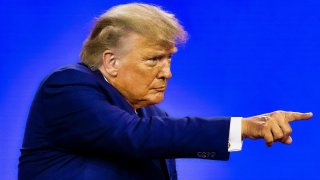Donald Trump the Felon: This Shouldn't Happen In America
Democrats have been using roundabout ways to try and defeat Donald Trump for almost a decade. It doesn’t work. Instead of executing impeachments and hush money trials, the Democrats need to construct a compelling political argument to convince voters to vote for someone else on the merits.
Summary: Former President Donald Trump’s conviction on all 34 counts in the Manhattan hush money case will have significant political and legal consequences.
-The trial, perceived by many as politically motivated, could heavily influence the 2024 presidential election and public trust in the judicial system.
-Critics argue that the charges, initially a misdemeanor related to improperly booked payments to Michael Cohen for a hush money deal, were unjustly elevated to felonies by Manhattan DA Alvin Bragg.
-The trial's timing and the overwhelmingly Democratic jury further fuel concerns of judicial abuse aimed at preventing Trump's return to office, potentially strengthening his political position.
Trump’s Conviction: Political Motivations and Judicial Abuse?
Former President Donald Trump’s conviction on all 34 counts in the Manhattan hush money case will have profound political and legal ripple effects, the contours of which won’t be clear for months. The conviction will undoubtedly impact the 2024 presidential election and has already influenced the way millions of Americans view the judicial system.
I want to give you my initial takeaways, the most important of which is that the trial and conviction represent a politically motivated abuse of the judicial system.
The fact that a former Republican President was charged with a 34-count felony, over what should have been a misdemeanor business-records charge, and then convicted in a Democrat-dominated jurisdiction, is more concerningly anti-democratic than anything Trump himself pulled while in office.
Politically Motivated Charges Against Donald Trump
Let’s consider the trial from the top, from the charges themselves.
Last year, when Manhattan DA Alvin Bragg issued the charges that Trump was just convicted on, the legal world was skeptical.
From a purely legal perspective, the charges seemed weak. Legal scholars, even Democrats, questioned the legitimacy of Bragg’s charges, which stemmed from a 2017 incident where Trump reimbursed Michael Cohen for making a hush payment to adult film star Stormy Daniels, and then booked the payment improperly, not as a reimbursement, but as an ongoing expense.
Trump’s failure to book the payment properly is possibly a crime under New York state law – a misdemeanor on which the statute of limitations had already expired and on which prosecutors shrugged off years ago, deciding sagely not to pursue.
Bragg, however, took a look at the misdemeanor charges and engaged in legal gymnastics, a unique creative effort to contort the misdemeanor into a felony. How? Bragg argued that the reimbursement was in furtherance of another crime, specifically a violation of federal campaign finance laws.
If you’re wondering how making a hush money payment to an adult film star constitutes a violation of campaign finance laws, you’re not alone. Campaign finance laws usually cover expenses like advertising and staff salary.
In contorting the misdemeanor into a felony, Bragg was able to extend the statute of limitations, making Trump’s 2017 payment (technically) fair game for prosecution. So, essentially, what I’m saying is that Bragg reverse-engineered the charges against Trump. The lieral political world wanted Trump’s defeated and the obviously ambitious Bragg got there with a little bit of imagination.
And somehow, with that imagination, Bragg managed to parse 34 separate felony charges from the reimbursement.
The Donald Trump Trial Timing
Heightening the sense that Bragg’s charges were politically motivated is the timing.
The hush money payment in question occurred in 2017. Charges were not brought until 2023.
Now, I have difficulty believing that the timing – when Trump emerged as the GOP front-runner for the 2024 election – was a coincidence.
Had Trump faded from the national spotlight after his 2020 defeat, never to run for office again, would Bragg have brought charges? My sense is that the answer is no.
And if the answer is no, if Bragg only brought charges when it became clear that Trump was a threat to win back the White House, then the charges represent the blatantly political weaponization of our judicial system to prevent an unpreferred candidate from seeking elected office. That’s not supposed to happen in America.
The Trial Had Issues
Given the incendiary nature of the charges, the fraught implications for American democracy, the trial itself needed to be perfect. Yet, the trial was corrupted from the start.
Trump’s team requested to change venue were denied, meaning Trump was subjected to a jury built from the population of one of the most overwhelmingly Democratic jurisdictions in the country. That a Democratic prosecutor was able to convince a Democratic jury that Democratic public enemy number one, Donald J. Trump, in the middle of his reelection campaign, was guilty on all counts, now seems like it was a foregone conclusion.
Democrats have been using roundabout ways to try and defeat Donald Trump for almost a decade. It doesn’t work. Instead of executing impeachments and hush money trials, the Democrats need to construct a compelling political argument, to convince voters to vote for someone else, on the merits. My guess, based on precedent, is that Bragg’s rubbish conviction will serve to legitimize Trump’s claim that he is the victim of a witch hunt, hence making him politically stronger.
About the Author: Harrison Kass
Harrison Kass is a defense and national security writer with over 1,000 total pieces on issues involving global affairs. An attorney, pilot, guitarist, and minor pro hockey player, Harrison joined the US Air Force as a Pilot Trainee but was medically discharged. Harrison holds a BA from Lake Forest College, a JD from the University of Oregon, and an MA from New York University. Harrison listens to Dokken.


